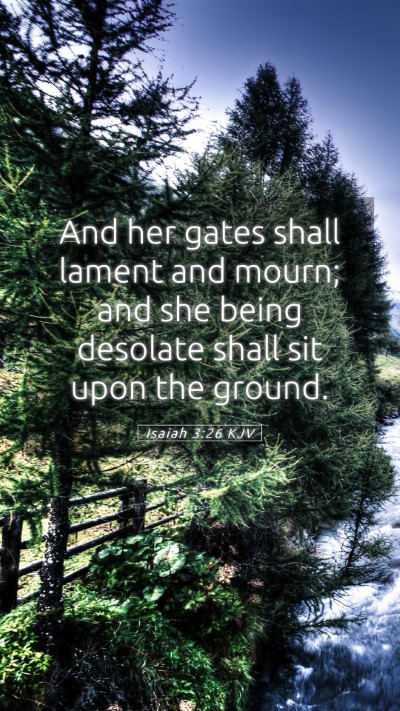Understanding Isaiah 3:26
Bible Verse: Isaiah 3:26
“And her gates shall lament and mourn; and she being desolate shall sit upon the ground.”
This verse serves as a profound reflection on the consequences of a nation's moral and spiritual decline. It highlights the sorrow and desolation that arise when a society turns away from righteousness. Below, we offer insights drawn from various public domain commentaries to deepen our understanding of this significant passage.
Summary of Commentary Insights
- Matthew Henry’s Commentary:
Henry emphasizes the imagery of desolation depicted in this verse. He notes that the “gates” of a city, representing its leadership and community, will be filled with grief as societal decay becomes evident. The mourning signifies the loss of security and prosperity, reflecting the dire spiritual state of the people.
- Albert Barnes’ Notes:
Barnes discusses the historical context, suggesting that the lamentation of the gates symbolizes the downfall of Jerusalem and its inhabitants. He points out that when a nation abandons its foundations of justice and morality, it faces inevitable ruin. The mention of desolation serves as a warning to those who neglect their spiritual duties.
- Adam Clarke’s Commentary:
Clarke offers a perspective on the despair that follows a breakdown in social order, indicating that the metaphor of sitting on the ground implies a position of helplessness. He connects this desolation with the broader theme of God’s judgment, asserting that spiritual apathy leads to national calamity.
Importance of Historical Context
To fully grasp the meaning of Isaiah 3:26, it is crucial to consider the historical setting. This verse appears during a time when Jerusalem was facing moral decay, political instability, and impending judgment. Understanding this backdrop aids in the interpretation:
- The Fall of Jerusalem: The warnings in Isaiah foreshadow the capture and destruction of the city, a pivotal moment in Israel's history.
- Sociopolitical Factors: The verse reflects the consequences of poor leadership and societal indifference towards God’s commandments.
- Spiritual Significance: It serves as a warning against complacency and the consequences that follow when a nation forsakes divine principles.
Application to Daily Life
Isaiah 3:26 prompts introspection regarding personal and communal values:
- Self-Examination: Individuals are encouraged to examine their own lives for signs of spiritual neglect.
- Community Responsibility: The passage calls for collective accountability in upholding moral standards and ethical living.
- Return to Righteousness: It emphasizes the need for a return to God's teachings to prevent societal deterioration.
Bible Study Insights
For those involved in Bible study groups or seeking Bible study tools, this verse can serve as a springboard for discussion on:
- How societal values are influenced by adherence to or rejection of biblical principles.
- Exploring the consequences of moral decay in contemporary society.
- Strategies for personal and community revival based on scriptural teachings.
Cross References
This verse connects with several other passages that enhance its themes of sorrow, judgment, and desolation:
- Lamentations 1:1-2: Reflects on the desolation of Jerusalem.
- Jeremiah 9:17-18: Calls for mourning over the spiritual condition of the people.
- Zephaniah 1:10-11: Describes the desolation and mourning that accompany judgment.
Conclusion
Isaiah 3:26 is a poignant reminder of the consequences of turning away from God. By examining this verse through detailed Bible verse commentary and scripture analysis, we uncover a powerful invitation to reflect on our lives and communities. The themes of mourning and desolation serve as a warning and a call to return to righteousness and vigilance.


